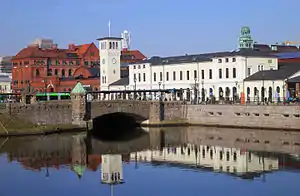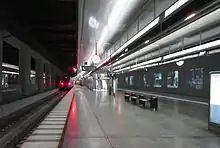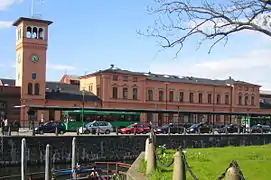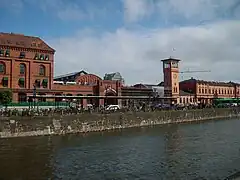Malmö Central Station
Malmö Central Station (Swedish: Malmö centralstation) is a railway station on the Southern Main Line in Malmö, Sweden, opened in 1856. It serves approximately 17 million passengers per year.[2]
Malmö Central Station | ||||||||||||||||||||||||||||||||||||||||||||||||||||||||||||||||||||||||||||||||||
|---|---|---|---|---|---|---|---|---|---|---|---|---|---|---|---|---|---|---|---|---|---|---|---|---|---|---|---|---|---|---|---|---|---|---|---|---|---|---|---|---|---|---|---|---|---|---|---|---|---|---|---|---|---|---|---|---|---|---|---|---|---|---|---|---|---|---|---|---|---|---|---|---|---|---|---|---|---|---|---|---|---|---|
 Southern facade and bus terminal | ||||||||||||||||||||||||||||||||||||||||||||||||||||||||||||||||||||||||||||||||||
| General information | ||||||||||||||||||||||||||||||||||||||||||||||||||||||||||||||||||||||||||||||||||
| Location | Malmö, Malmö Sweden | |||||||||||||||||||||||||||||||||||||||||||||||||||||||||||||||||||||||||||||||||
| Coordinates | 55°36′34″N 13°00′03″E | |||||||||||||||||||||||||||||||||||||||||||||||||||||||||||||||||||||||||||||||||
| Elevation | 3 m (9.8 ft) | |||||||||||||||||||||||||||||||||||||||||||||||||||||||||||||||||||||||||||||||||
| Owned by | Jernhusen | |||||||||||||||||||||||||||||||||||||||||||||||||||||||||||||||||||||||||||||||||
| Operated by | Trafikverket | |||||||||||||||||||||||||||||||||||||||||||||||||||||||||||||||||||||||||||||||||
| Line(s) | West Coast Line City Tunnel & Öresund Line Southern Main Line | |||||||||||||||||||||||||||||||||||||||||||||||||||||||||||||||||||||||||||||||||
| Distance | 617.8 km (383.9 mi) from Stockholm C | |||||||||||||||||||||||||||||||||||||||||||||||||||||||||||||||||||||||||||||||||
| Platforms | 6 | |||||||||||||||||||||||||||||||||||||||||||||||||||||||||||||||||||||||||||||||||
| Tracks | 10 | |||||||||||||||||||||||||||||||||||||||||||||||||||||||||||||||||||||||||||||||||
| Construction | ||||||||||||||||||||||||||||||||||||||||||||||||||||||||||||||||||||||||||||||||||
| Structure type | Underground (Tracks 1-4) Above ground (Tracks 5-10) | |||||||||||||||||||||||||||||||||||||||||||||||||||||||||||||||||||||||||||||||||
| Platform levels | 2 | |||||||||||||||||||||||||||||||||||||||||||||||||||||||||||||||||||||||||||||||||
| Bicycle facilities | Yes | |||||||||||||||||||||||||||||||||||||||||||||||||||||||||||||||||||||||||||||||||
| Accessible | Yes | |||||||||||||||||||||||||||||||||||||||||||||||||||||||||||||||||||||||||||||||||
| Other information | ||||||||||||||||||||||||||||||||||||||||||||||||||||||||||||||||||||||||||||||||||
| IATA code | XFP | |||||||||||||||||||||||||||||||||||||||||||||||||||||||||||||||||||||||||||||||||
| History | ||||||||||||||||||||||||||||||||||||||||||||||||||||||||||||||||||||||||||||||||||
| Opened | 1856 | |||||||||||||||||||||||||||||||||||||||||||||||||||||||||||||||||||||||||||||||||
| Passengers | ||||||||||||||||||||||||||||||||||||||||||||||||||||||||||||||||||||||||||||||||||
| 43 300 per weekday (2016)[1] | ||||||||||||||||||||||||||||||||||||||||||||||||||||||||||||||||||||||||||||||||||
| Services | ||||||||||||||||||||||||||||||||||||||||||||||||||||||||||||||||||||||||||||||||||
| ||||||||||||||||||||||||||||||||||||||||||||||||||||||||||||||||||||||||||||||||||
With the opening of the City Tunnel in 2010, the station began through services connecting south to Copenhagen via the Öresund Line, to stations north on the Southern Main Line, saving at least 15 minutes for through passengers.
Description
The central station has ten tracks. Four tracks are underground at the northernmost point of the City Tunnel, and 6 tracks are above ground in the old terminus station. It is marked as a listed building. The station consists mainly of two perpendicular buildings above ground - the central hall and the terminus train shed - and a newer glass corridor in between these two older buildings.[3]
The glass corridor was inaugurated in 2010 as part of the City Tunnel project in order to connect the bus stops south of the station with the platforms, the escalators to the lower level platforms and the taxi station located just north of the station. Along the corridor are SJ and Skånetrafiken ticket sales, exchange offices and kiosks, making it the main waiting area of the station. The central hall which previously filled that function is since 2011 a food court with a number of restaurants and smaller shops.
The underground platforms can also be accessed from an entrance located just west of the station at the Anna Lindh's place.
History
Malmö Station was first opened in 1856, coinciding with the opening of the Malmö–Lund railway. At the time, the area was located in the outer edges of the city, but was convenient to Copenhagen-bound ferries, which loaded and unloaded in the Inre hamnen right in front of the station building.
The building was nearly destroyed ten years later in a fire, on 14 December 1866. When the building was reconstructed, the bell tower was kept. That part, between the platforms and the square Centralplan, was reopened in 1872.[4]
More and more lines were built and consequently more and more tracks and train sheds were needed. The new train shed with four new tracks opened in 1891. The Malmö-Kontinentens Järnväg from Malmö to Trelleborg was built in 1898. In 1926, Malmö Central Station became the station's official name.[5]
Though the train shed was built as a terminus, there was also a single through-line for freight next to the station building, allowing hopper wagons to access the port, where they served a large granary plant producing most of the flour for baking in the counties of Skåne and Halland.
In 2000, both local and long-distance trains began running directly to Denmark via the new Öresund Bridge. Malmö became the centre of the new Öresund train regional railway system spanning eastern Denmark and much of southern Sweden, which in 2009 became integrated with local buses and trains in most of its service areas. The trains were, however, forced to reverse direction in Malmö’s terminal station, which created delays for passengers travelling to Denmark from Lund and further north, and restricted the frequency of service, as each train had to both enter and leave Malmö by the same tracks.
This situation was solved with the opening of the City Tunnel in December 2010, finally allowing through traffic. All passenger traffic to/from Denmark now uses the tunnel, and most local trains use it, too, terminating instead at Hyllie station at the other end of the tunnel if not going beyond Malmö.

The tunnel tracks make up tracks 1-4, and most traffic has shifted to this lower level of Malmö Central Station. The terminus station was renovated at the same time to accommodate occasional long-distance trains including some services to Stockholm and the night express to Berlin. Its tracks are numbered 5-10 (six tracks as opposed to the original seven: one track was torn up during renovation to allow for more commercial space adjacent to the Centralplan bus terminal). The adjacent train shed previously used for local Pågatågen was demolished in its entirety to allow for an extension to the Centralplan, its traffic taken over by the City Tunnel.
Traffic
The stations track layout is numbered 1-10 from north to south, beginning with the four underground through tracks.
.jpg.webp)
The underground part of the station - tracks 1-4 - is a through station and consists of two island platforms. The northernmost platform (track 1-2) is usually served by trains heading south into the city tunnel. This is due to Denmark using right-hand traffic for railway, and not left-hand traffic like Sweden. In order not to have to switch direction of traffic at the Öresund Bridge, which was the case before the City Tunnel extension, and thereby increasing capacity, the switch from left to right traffic now happens entering into the Malmö Central Station's underground tracks coming from north, thus making the entire City Tunnel operate right-hand traffic. The south platform (track 3-4) is thus usually served by trains heading north out of the City Tunnel.
The above ground part of the station - tracks 5-10 - is a terminal station made up of four side platforms with two tracks each between the three spaces between these. From here services usually either begin or terminate their route. A decent amount of train services - both local, regional and long-distance - still fall into this category, and thus the terminus station is still in frequent use, though not as frequent as the underground through station.
Just south of the station building is the station's bus terminal. Its western part (modes A-F) is for local city buses, and the eastern part (modes G-I) is used by regional buses, long-distance services and temporary replacement buses.[6]
Awards
In 2011 Malmö Central Station won the Brunel Award for its architecture.
Gallery
.jpg.webp) West Façade
West Façade View from Centralplan
View from Centralplan South façade (in its former colours)
South façade (in its former colours)
See also
References
- Skånetrafikens tågresande 2016
- "Starbucks öppnar på två av Sveriges största tågstationer i samarbete med SSP" (in Swedish). Cision. 2011-08-29. Archived from the original on 2012-07-31. Retrieved 2012-08-25.
- "Glashallen, en ny stationsbyggnad i centrala Malmö". ncc.se. Retrieved 3 October 2022.
- "Centralstationen,Malmö". sten25.tripod.com. Archived from the original on 16 October 2014. Retrieved 12 January 2022.
- "Sveriges Järnvägsstationer". www.jvmv.se. Archived from the original on 5 October 2011. Retrieved 12 January 2022.
- "Malmö C (hållplatskarta)" (PDF). Skånetrafiken. Retrieved 3 October 2022.
External links
 Media related to Malmö centralstation at Wikimedia Commons
Media related to Malmö centralstation at Wikimedia Commons
